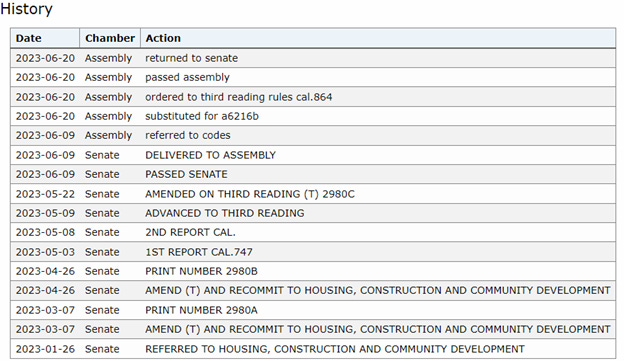What patterns do we see emerging in the NYC housing industry?
Governor Hochul hasn’t yet signed the important bills she is supposed to.
Recent e-mail leaks between REBNY and Hochul’s office bring to light some surprising policy items from REBNY.
Finally, Governor Hochul sits down with influential groups to rally support for her policies but faces pushback.
The key word today is compromise – conceding positions here to notch wins over there.
So far, it’s unclear what has happened to the new rent stabilized bills (explained here and here) that would amend 2019’s HSTPA. The bills were passed by the State Assembly on the night of June 20th, or a little over 3.5 weeks ago. According to Legiscan, a webpage that tracks the movement of legislation like UPS tracking numbers track packages, the bills have not even been sent to the governor’s desk as yet (this is what it looks like when bills have been sent to the Gov.). The delayed sending to the Governor can be attributed to a few things. Since the bill was passed after the legislative session, the governor has more time than she usually does to veto or pass the bill. There could also be a backlog of other bills for the Governor’s office to sign, as some bills from May are only being signed into law now. Still, these explanations don’t seem sufficient for a Governor so bent on securing wins for the housing and real estate sector. I think the Governor is negotiating deals. Maybe that means signing the hotly contested bills into law, maybe not. If she does approve these bills, I think the real estate industry will be offered some carrots to offset the pain from the bills.
The governor’s talks with REBNY head James Whelan support the theme of compromise. A leaked email has surfaced from April of this year where REBNY Chief Whelan shared some real estate initiatives he was hopeful to get passed.
Expand Right to Counsel (RTC)– expand right to counsel beyond NYC and into NYS.
Add judges to the court – Add 10 judges to the housing court bench to speed up housing case processing times.
Modified Good Cause – cap rent hikes at 10% a year for all housing during times of housing emergencies. This initiative was titled ‘address price gouging’ and it borrowed language from the NY Attorney General’s memo on price gouging.
Whelan’s ideas display an air of compromise and deference to tenant advocate groups. RTC has been very successful in reducing evictions across NYC, since its implementation in 2017. Expanding RTC would benefit tenants statewide and allow their advocates to see real wins. It’s an open secret that the courts are back logged at this time in NYC. This can leave landlords in a state of limbo sans rent for many months in a way that is unique to real estate ownership in NYC. Adding judges would help owners (or tenants) be sure that when there are conflicts, they are resolved in a timely fashion. Finally - capping rent increases at 10%. This is the most striking proposal. This would have given the legislature what it wanted in a rent cap. It also would have appeased owners who worry about caps on rent increases. Outside of years when a vacancy is realized, few investors that I know increase rents 10% year over year. Whelan’s ideas didn’t get introduced in a formal legislative bill, but the efforts at compromise by Hochul are notable.
Governor Hochul is also opening lines of dialogue with Construction and Labor Unions of New York. The recent headline is that talks have slowed due to a disagreement over labor costs. Hochul wants to extend the deadline for existing 421 A eligible projects beyond 2026. The Construction Union wants to secure higher wages for its members who would likely work those job sites:
“…if the people who build this housing are not paid fairly enough to afford it themselves, it’s not really affordable.” – Secretary Treasurer of District Council 9.
It is hard to argue with that rhetoric!
While Hochul and the trade unions have not had a meeting of the minds, the fact that these conversations are happening tells us that compromise may happen somewhere along the way. The 421 A abatement’s expiration in 2026 would rule out the development of an estimated 30,000 new apartments in NYC. Hochul is determined not to let that happen. Speaking to construction unions is a great step in the direction of deal making.
Sources: New York Focus, Legiscan




I can argue with the rhetoric. Its not true! Construction workers CAN afford to live in the Subsidized units that they build!
As owners are we to be happy that "RTC has been very successful in reducing eviction across NYC"? It just means that a bunch of low-end lawyers know just enough about the garbage, biased, Tenant-centric system we have, to allow judges to blackmail owners EVEN MORE OFTEN into accepting crappy settlements rather than issuing the eviction orders that they are entitled to. They are just kicking the problem down the line. A DROP IN EVICTION ORDERS ARE A SIGN THAT THE SYSTEM IS GETTING MORE BROKEN, NOT SOMETHING TO APPLAUD!